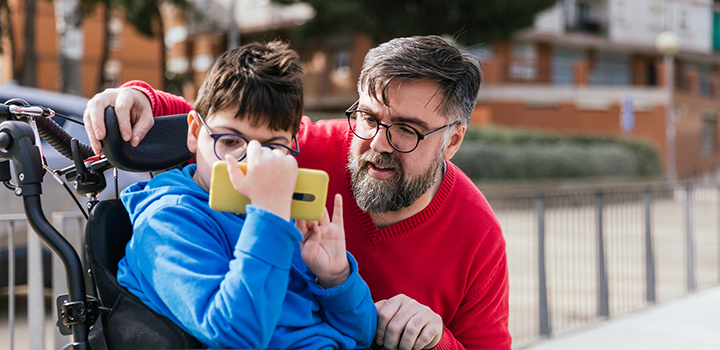More support needed for children with disabilities using the Internet
By: Communications

Children with disabilities need better support to manage their online lives and potential online risks, according to new research led by the University of East Anglia (UEA).
For children with disabilities, being online and part of a well-connected community can have huge benefits. However, children with disabilities will encounter more online risks, and these can escalate more quickly than for their peers.
The research shows that extra support from professionals such as teachers, youth workers and speech and language therapists does not always happen when they are learning, playing, and socialising on the Internet. It also highlights how this impacts on the ability of children with disabilities to access or activate digital resilience support from this community of professionals.
Digital resilience refers to the ability to learn how to recognise, manage and recover from online risk experiences, such as bullying, sexual messaging and mis/disinformation, and is an increasingly important process for participating an increasingly connected world.
The study, published in the journal New Media and Society and involving researchers from the University of Liverpool, finds that professionals supporting children with disabilities need to better support their connected lives to promote community digital resilience and counter the digital inequalities.
The findings come as the latest draft of the Online Safety Bill nears the end of its passage through Parliament. While this landmark legislation will put greater responsibility on tech companies to do more to keep users safe, including children, it is widely accepted that it will not be able to eradicate all risk from online life. This underlines the need for improvements to user education about online risk, especially for vulnerable groups such as children with disabilities.
Lead author Dr Simon P Hammond, of UEA’s School of Education and Lifelong Learning, said: “Educators spend a disproportionate amount of time dealing with unforeseen safeguarding events and/or sudden disciplinary issues, a key contributor to high and stressful workloads.”
Dr Jeanette D’Arcy, of the University of Liverpool’s Communications and Media Department, commented: "Education professionals need support to invest their time in building and maintaining the kinds of connections in their communities that will help them provide the best support to this group.”
“Redistributing time to be invested into addressing structural holes, gaps between differing professionals surrounding children with disabilities, is likely to pay dividends in other areas,” added Dr Hammond. “Related to this, supporting other community members is also key to promoting children’s digital resilience.
“This means children with disabilities will have more support when learning how to recognise, manage and recover from online risk experiences – an increasingly key task for all citizens. For communities to be greater than the sum of their parts, responsibility needs to be diffused yet ownership collective. A thorny but not impossible task and one likely to pay dividends.
“Despite learning best through concrete experiences, children with disabilities receive less supported learning opportunities to develop digital resilience in the face of online risks. In short, professional communities are providing least support to the group most in need.”
Previous research has focused on the development of digital resilience at an individual level but the ways in which surrounding networks of community support impact this is underexplored.
Dr Gianfranco Polizzi, of the University of Liverpool, said: “The paper’s findings illustrate that professionals should examine community resources, assets, and be ‘connection brokers’, who activate and provide access to a variety of assets and manage pools of resources to build digital resilience at a community level as well as for the individual.”
The research was funded by Internet Matters, an organisation that provides resources, information and support to keep children safe online. Head of Policy and Research Simone Vibert said: “Our data consistently shows that children who are vulnerable offline, including as a result of disability, are more vulnerable online too, and need specific support to increase their resilience. This research paper points to the critical role of professionals in providing this support.
“Teachers and other professionals have a deep influence on children’s lives, and it is a missed opportunity if this influence is not harnessed to help children navigate online risks – so that they can enjoy the benefits of connected technology more safely. Internet Matters welcomes this report and is committed to doing our bit to provide professionals with the support they need to engage children in their online lives.”
The research involved 30 online semi-structured interviews with professionals supporting the education, growth, and wellbeing of children with disabilities from across the UK, including teachers and youth workers.
‘Connection brokers: How educators work within and between social networks to cultivate community digital resilience to support children with disabilities using the Internet’ is published in New Media and Society on March 24.
Related Articles

Fresh evidence of ChatGPTs political bias revealed by comprehensive new study
The artificial intelligence platform ChatGPT shows a significant and systemic left-wing bias, according to a new study by the University of East Anglia (UEA).
Read more
A values crisis underpins the biodiversity and climate emergency
A new study published in Nature shows how undervaluation of nature is foundational to the environmental crisis we face.
Read more
Study reveals the increasing cost of debt caused by climate change
Climate change will increase the cost of sovereign and corporate debt worldwide according to new research led by the University of East Anglia (UEA) and the University of Cambridge.
Read more